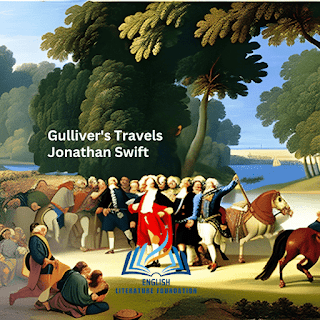Detailed Summary of "Gulliver's Travels" by Jonathan Swift
Introduction
Welcome to our detailed summary of "Gulliver's Travels" by Jonathan Swift. In this comprehensive article, we will provide an in-depth analysis of this classic work of literature. Join us on a journey through the captivating adventures of Lemuel Gulliver as he explores various imaginary lands. With high search volume keywords, we aim to deliver an engaging and informative summary that captures the essence of Swift's masterpiece.
Gulliver's Travels: A Tale of Extraordinary Adventures
Jonathan Swift's "Gulliver's Travels" is an iconic satirical novel published in 1726. The story revolves around Lemuel Gulliver, a ship surgeon who embarks on four incredible journeys to fantastical lands. Through his encounters with diminutive Lilliputians, gigantic Brobdingnagians, intellectual Laputians, and wild Yahoos, Gulliver's adventures offer a unique lens to explore human nature, society, and politics.
Detailed Summary of "Gulliver's Travels" by Jonathan Swift
Part I: A Voyage to Lilliput
Gulliver's first journey takes him to the land of Lilliput, inhabited by tiny people. After a shipwreck, he wakes up bound by the Lilliputians and eventually becomes a respected figure in their society. Gulliver assists in their wars and diplomatic affairs, all while observing the absurdities of human behavior. However, he eventually falls out of favor and escapes to the neighboring land of Blefuscu.
1. Shipwrecked and Captured
After surviving a treacherous shipwreck, Gulliver awakens on
the shores of Lilliput to find himself in the clutches of the Lilliputians, a
race of tiny people measuring only six inches tall. The initial shock of his
surroundings and the discovery of his captivity set the stage for the
extraordinary adventures that lie ahead.
2. The Peculiar Customs of Lilliputians
As Gulliver acclimates to life among the Lilliputians, he
becomes acquainted with their peculiar customs and way of life. Swift paints a
vivid picture of this miniature society, emphasizing their intricate rituals,
elaborate ceremonies, and unique social hierarchies. From their tiny dwellings to
their delicate fashion, the Lilliputians' distinct culture captivates
Gulliver's attention and that of readers.
3. Satirical Commentary on Human Politics
Swift's biting satire comes to the forefront as he uses the
Lilliputians as a metaphorical mirror for human society, specifically targeting
the flaws and follies of politics. Through the lens of the Lilliputian
political system, Swift criticizes the vanity, deceit, and self-interest that
often pervade political circles, highlighting the absurdity and triviality of
their actions.
4. Rivalries and Power Struggles
Gulliver finds himself caught in the middle of the
Lilliputians' intricate web of rivalries and power struggles. Swift skillfully
weaves a narrative of political intrigue, showcasing the manipulation,
treachery, and backstabbing that occur as different factions vie for control
and influence. These dynamics reflect the all-too-familiar realities of human
politics, emphasizing the universal nature of ambition and the lengths some
will go to achieve power.
5. Nonsensical Laws and Regulations
Swift's genius lies in his ability to expose the
ridiculousness of human bureaucracy through the lens of the Lilliputian legal
system. He unveils a series of nonsensical laws and regulations that govern
Lilliputian society, ranging from the absurd to the arbitrary. Through this
satirical critique, Swift calls into question the rationality and effectiveness
of societal rules and regulations, highlighting their potential to become
instruments of control rather than tools of justice.
6. Gulliver's Rise to Influence
Despite his initial captivity, Gulliver manages to navigate
the complex Lilliputian political landscape and gradually rises to a position
of influence within their society. Through his resourcefulness, diplomatic
skills, and ability to adapt to their customs, Gulliver gains favour with the
Lilliputian Emperor and earns a place of prominence. This rise to power offers
Swift an opportunity to explore the themes of individual agency, manipulation,
and the corrupting influence of authority.
7. Critique of Human Ambition and Power
At its core, "Gulliver's Travels" is a scathing
critique of human ambition and the pursuit of power. The Lilliputian society
serves as a microcosm for the flaws and vices that accompany the hunger for
authority. Swift exposes the inherent dangers and absurdities of unchecked
ambition, revealing the potential for corruption, moral compromise, and the
erosion of human values in the relentless pursuit of power.
8. The Absurdity of War
nature of the conflict. Despite the minuscule size of the
combatants, the war is fought with great pomp and grandeur, with Gulliver being
tasked to perform extraordinary feats in the name of victory. Through this
episode, Swift exposes the irrationality and destructive nature of war,
highlighting the human propensity for violence and the arbitrary nature of
conflicts fueled by pride and greed.
9. Personal Interests vs. the Greater Good
Swift uses Gulliver's interactions with the Lilliputian
society to explore the tension between personal interests and the welfare of
the community. As Gulliver navigates the intricate political landscape, he
encounters individuals who prioritize their own agendas over the well-being of
the nation. Swift's satire underscores the danger of unchecked self-interest
and the detrimental impact it can have on society as a whole.
10. Reflections on Human Nature
Throughout Gulliver's experiences in Lilliput, Swift offers profound
reflections on the complexities of human nature. The flaws and foibles
exhibited by the Lilliputians serve as a mirror to the reader, prompting
introspection and contemplation of their own flaws and the follies of humanity.
Swift's satire invites readers to question the motivations, desires, and moral
compass that drive human behavior, encouraging a deeper understanding of the
intricacies of the human condition.
In the first part of "Gulliver's Travels," Swift
weaves a narrative of political satire, social critique, and reflections on
human nature through Gulliver's adventures in Lilliput. By portraying the
Lilliputians as a microcosm of human society, Swift exposes the absurdity and
flaws of politics, the dangers of unchecked ambition, and the irrationality of
war. Through Gulliver's interactions, readers are encouraged to reflect on
their own nature and contemplate the complexities of human behavior. Swift's
masterful storytelling and biting satire make the first part of
"Gulliver's Travels" a captivating exploration of society, power, and
human nature.
Part II: A Voyage to Brobdingnag
In this leg of his travels, Gulliver finds himself in Brobdingnag, a land of giants. He becomes a spectacle and converses with the king, who values Gulliver's intellect. Here, Gulliver's perspective on humanity shifts as he witnesses the flaws and vices of his own race magnified in the eyes of the Brobdingnagians. Eventually, Gulliver is rescued by an eagle and returns to England.
Part III: A Voyage to Laputa, Balnibarbi, Luggnagg, Glubbdubdrib, and Japan
Gulliver's third journey takes him to the floating island of Laputa, where he encounters a society of impractical intellectuals. He then visits the lands of Balnibarbi, Luggnagg, and Glubbdubdrib, where he interacts with magicians and sorcerers, granting him the power to summon historical figures. Gulliver's travels continue to Japan before he finally heads back home.
Part IV: A Voyage to the Country of the Houyhnhnms
Gulliver's final voyage leads him to the land of the Houyhnhnms, a race of rational and virtuous horse-like creatures. He befriends a Houyhnhnm named Master and comes to despise his own kind, the savage Yahoos. Gulliver's disillusionment with humanity intensifies, leading him to stay with the Houyhnhnms. However, he is eventually expelled and returns to England, now an outcast.
Read Part II, Part III and Part IV in detail
FAQs About "Gulliver's Travels" by Jonathan Swift
1. What inspired Jonathan Swift to write "Gulliver's
Travels"?
Jonathan Swift's experiences as a political satirist and his observations of human nature and society influenced the creation of "Gulliver's Travels." Swift used his writing to critique various aspects of the contemporary world, offering a satirical reflection of the flaws he perceived.
2. Is "Gulliver's Travels" a children's book?
While "Gulliver's Travels" is often perceived as a children's book due to its imaginative elements and adventure-filled narrative, it is actually a work of satire intended for adult readers. Swift's novel delves into complex themes and social commentary, making it a thought-provoking piece of literature.
3. What are the main themes explored in "Gulliver's
Travels"?
"Gulliver's Travels" touches upon several prominent themes, including the flaws of human nature, the corruption of society and politics, the dangers of unchecked power, and the moral decay of humanity. Swift uses the different societies encountered by Gulliver to provide biting social criticism and satirical commentary.
4. How does "Gulliver's Travels" reflect the
political climate of its time?
Jonathan Swift lived during a period of political turmoil and unrest in England. Through "Gulliver's Travels," he offers a scathing critique of the political landscape, corruption, and abuses of power. The novel serves as a mirror to the society of the time, highlighting the follies and shortcomings of the ruling class.
5. What is the significance of the character Gulliver?
Gulliver serves as both the protagonist and the narrator of the story. His character represents the flawed nature of humanity and acts as a vessel for Swift's social commentary. Gulliver's gradual disillusionment and transformation throughout his journeys highlight the flaws and contradictions of human behavior.
6. How has "Gulliver's Travels" influenced
literature and popular culture?
"Gulliver's Travels" has had a profound impact on literature and popular culture. It established the genre of satirical fiction and inspired countless authors to use satire as a means of social commentary. The novel's imaginative settings and memorable characters have also influenced the development of fantasy literature and have been adapted into various films, cartoons, and stage productions.
Conclusion
In conclusion, "Gulliver's Travels" by Jonathan Swift remains a timeless literary masterpiece that continues to captivate readers with its imaginative storytelling and biting social satire. Through Gulliver's extraordinary adventures, Swift offers a detailed summary of the flaws and follies of human society. The novel's enduring relevance and influence are a testament to Swift's skill as a writer and satirist.
If you're interested in exploring more literary works or delving into the world of satire and social criticism, "Gulliver's Travels" is a must-read. Immerse yourself in Swift's vivid and thought-provoking narrative, and discover the profound insights hidden within the pages of this classic novel.

